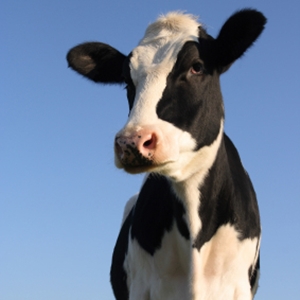
Emissions from transport totaled 6.76 billion tons, and emissions from electricity and heat production reached 12.48 billion tons, according to Worldwatch Institute's Vital Signs Online service.
Growth in agricultural production between 1990 and 2010 outpaced growth in emissions by a factor of 1.6, demonstrating increased energy efficiency in the agriculture sector.
Top agricultural greenhouse gas contributor: livestock flatus
The three most common gases emitted in agriculture are nitrous oxide, CO2 and methane. Methane is generally produced when organic materials - crops, livestock feed and manure - decompose anaerobically (without oxygen). Methane accounts for 50% of total agricultural emissions. Digestion of organic materials by livestock and the resulting flatus is the largest source of methane emissions and of agricultural emissions overall.
Nitrous oxide is generated by microbial breakdown of nitrogen in soils and manures. Nitrous oxide production is particularly high where there is excess nitrogen in the soil, which often occurs when nitrogen-rich synthetic fertilisers are applied. Nitrous oxide contributes about 36% of agricultural greenhouse gas emissions.
Finally, carbon dioxide is released from soils when organic matter decomposes aerobically (with oxygen). The largest source of CO2 emissions within agriculture is the drainage and cultivation of "organic soils" in wetlands or bogs with high organic material. When these areas are drained for cultivation, organic matter within the soil decomposes rapidly, releasing CO2. This process accounts for around 14% of total agricultural greenhouse gas emissions.
Emissions from livestock rose 7.6% worldwide between 1990 and 2010, but regional variation was high. At 51.4% and 28.1% respectively, Africa and Asia saw their emissions increase, while emissions in Europe and Oceania fell by 48.1% and 16.1%. Europe's significant reduction in emissions parallels the decline in its beef production between 1990 and 2010, but it may also reflect increased use of grains and oils in cattle feed instead of grasses.
Adding oil to feed cuts methane, but has a down side
"Adding oils or oilseeds to feed can help with digestion and reduce methane emissions. But a shift from a grass-based to a grain- and oilseeds-based diet often accompanies a shift from pastures to concentrated feedlots, which has a range of negative consequences such as water pollution and high fossil fuel consumption," said Laura Reynolds, Worldwatch Food and Agriculture Researcher and the study's author. "Aside from reducing livestock populations, there is no other clear pathway to climate-friendly meat production from livestock."
Manure that is deposited and left on pastures contributes to global nitrous oxide emissions because of its high nitrogen content. When more nitrogen is added to soil than is needed, soil bacteria convert the extra nitrogen into nitrous oxide and emit it into the atmosphere - a process called nitrification. Emissions from manure on pasture were highest in Asia, Africa and South America, accounting for a combined 81% of global emissions from this source.
While reducing livestock populations is one way to reduce global emissions, there are numerous other opportunities for mitigation, many of which offer environmental and even economic co-benefits. For instance, growing trees and woody perennials on land can sequester carbon while helping to restore soils, reduce water contamination and provide beneficial wildlife habitat.
- Adapted for Health24 from a press release by the Worldwatch Institute, May 2013




 Publications
Publications
 Partners
Partners









